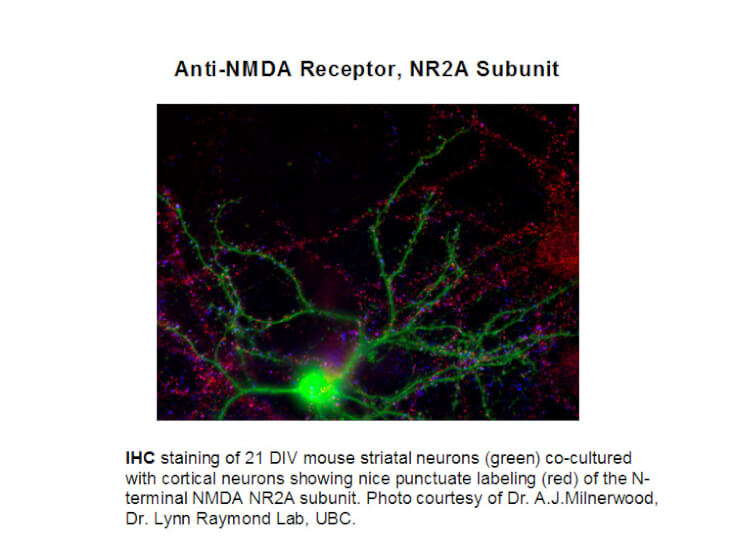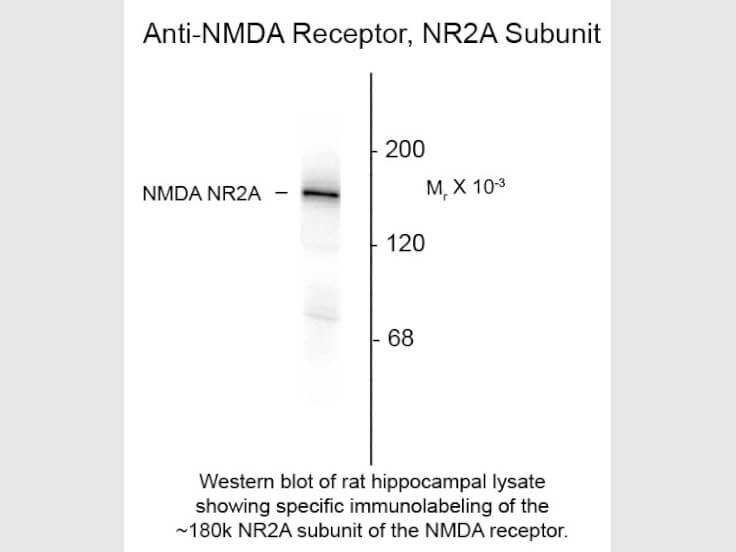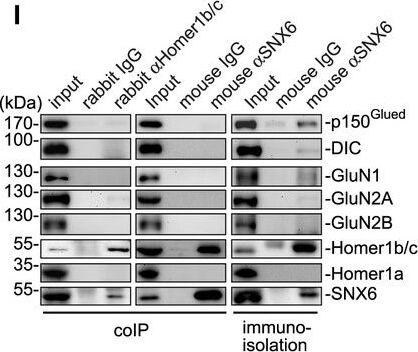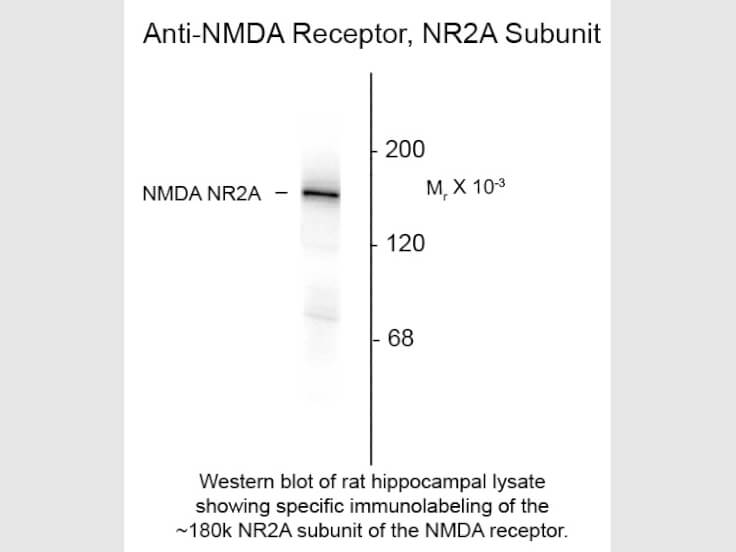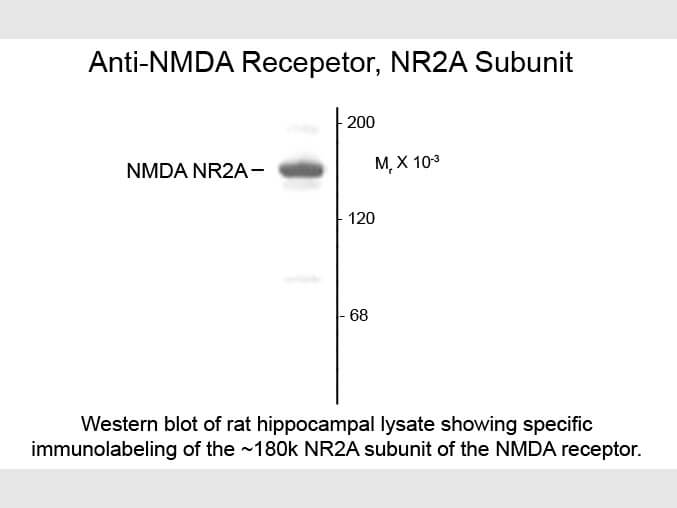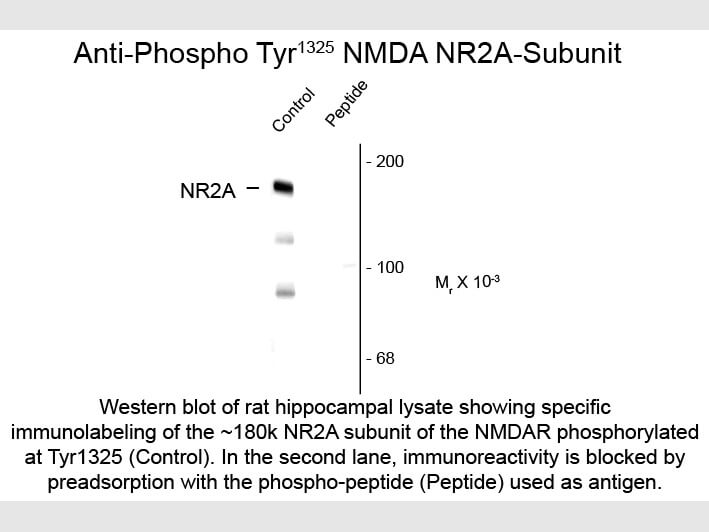Datasheet is currently unavailable. Try again or CONTACT US
NMDA R2A Antibody
Rabbit Polyclonal
3 References
612-401-D89
100 µL
Liquid
WB, IF
Rat
Rabbit
Shipping info:
$50.00 to US & $70.00 to Canada for most products. Final costs are calculated at checkout.
Product Details
Anti-NMDA R2A (RABBIT) Antibody - 612-401-D89
Glutamate [NMDA] receptor subunit epsilon-1, N-methyl D-aspartate receptor subtype 2A, NMDAR2A, NR2A, Grin2a
Rabbit
Polyclonal
IgG
Target Details
Grin2a - View All Grin2a Products
Rat
Conjugated Peptide
Anti-NMDA R2A Antibody was produced by repeated immunizations with a synthetic peptide corresponding to amino acid residues from the N-terminal region of the NR2A subunit.
Anti-NMDA R2A antibody is directed against NMDA R2A protein. The antibody was affinity purified from monospecific antiserum by immunoaffinity purification. Expect reactivity with the following species based on 100% sequence homology: bovine, canine and mouse.
Q00959 - UniProtKB
Application Details
WB
IF
- View References
Anti-NMDA R2A Antibody is tested for use in Western Blotting and ICC. Specific conditions for reactivity should be optimized by the end user. Expect a band of approximately 180 kDa in size corresponding to the NR2A subunit of the NMDA receptor in the appropriate cell lysate or extract.
Formulation
0.01 M HEPES, 0.15 M Sodium Chloride, pH 7.5
0.1 mg/ml Bovine Serum Albumin (BSA) - IgG and Protease free, 50% (v/v) Glycerol
Shipping & Handling
Dry Ice
Store vial at -20° C prior to opening. This product is stable at 4° C as an undiluted liquid. For extended storage, aliquot contents and freeze at -20° C or below. Avoid cycles of freezing and thawing. Dilute only prior to immediate use.
Expiration date is one (1) year from date of receipt.
NMDA R2A Antibody detects NMDA R2A protein. The ion channels activated by glutamate are typically divided into two classes. Glutamate receptors that are activated by kainate and α-amino-3-hydroxy-5-methyl-4-isoxalone propionic acid (AMPA) are known as kainate/AMPA receptors (K/AMPAR). Those that are sensitive to N-methyl-D-aspartate (NMDA) are designated NMDA receptors (NMDAR). The NMDAR plays an essential role in memory, neuronal development and it has also been implicated in several disorders of the central nervous system including Alzheimer’s, epilepsy and ischemic neuronal cell death. The NMDA receptor is also one of the principal molecular targets for alcohol in the CNS. The NMDAR is also potentiated by protein phosphorylation. The rat NMDAR1 (NR1) was the first subunit of the NMDAR to be cloned. The NR1 protein can form NMDA activated channels when expressed in Xenopus oocytes but the currents in such channels are much smaller than those seen in situ. Channels with more physiological characteristics are produced when the NR1 subunit is combined with one or more of the NMDAR2 (NR2 A-D) subunits. Anti-NMDA R2A Antibody is ideal for investigators involved in Neuroscience, Cell Signaling, and Signal Transduction research.
Guo Z et al. (2022). Activity-dependent PI4P synthesis by PI4KIIIα regulates long-term synaptic potentiation. Cell Rep.
Applications
IF, Confocal Microscopy; WB, IB, PCA
Wang et al. (2017). Post-acute delivery of memantine promotes post-ischemic neurological recovery, peri-infarct tissue remodeling, and contralesional brain plasticity. Journal of Cerebral Blood Flow & Metabolism
Applications
WB, IB, PCA
Niu et al. (2017). Ablation of SNX6 leads to defects in synaptic function of CA1 pyramidal neurons and spatial memory. Elife
Applications
WB, IB, PCA
This product is for research use only and is not intended for therapeutic or diagnostic applications. Please contact a technical service representative for more information. All products of animal origin manufactured by Rockland Immunochemicals are derived from starting materials of North American origin. Collection was performed in United States Department of Agriculture (USDA) inspected facilities and all materials have been inspected and certified to be free of disease and suitable for exportation. All properties listed are typical characteristics and are not specifications. All suggestions and data are offered in good faith but without guarantee as conditions and methods of use of our products are beyond our control. All claims must be made within 30 days following the date of delivery. The prospective user must determine the suitability of our materials before adopting them on a commercial scale. Suggested uses of our products are not recommendations to use our products in violation of any patent or as a license under any patent of Rockland Immunochemicals, Inc. If you require a commercial license to use this material and do not have one, then return this material, unopened to: Rockland Inc., P.O. BOX 5199, Limerick, Pennsylvania, USA.

